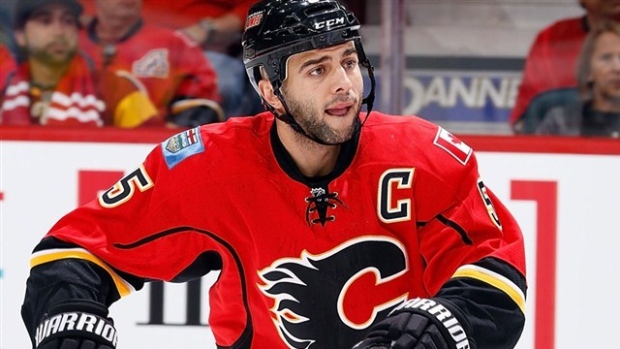Oct 23, 2014
Yost: Giordano excels amid Flames' struggles
Though Mark Giordano had the counting numbers to legitimize his Norris Trophy candidacy last season, with 14 goals and 33 assists in 64 games, the crux of the argument in support was based on how much better the Flames were when Giordano was on the ice. Travis Yost examines the Flames' defensive standout.
By Travis Yost

Though Mark Giordano had the counting numbers to legitimize his Norris Trophy candidacy last season, with 14 goals and 33 assists in 64 games, the crux of the argument in support was tied up in Calgary’s Corsi% splits. With Giordano on the ice last season at 5-on-5, Calgary controlled 53.4% of the play – the mark of an elite hockey team. With Mark Giordano off of the ice last season, Calgary controlled just 43.1% of the play – the mark of a lottery-bound hockey team.
The difference isn’t anything we have seen since Corsi% started being collected in the 2007-2008 season. To illustrate this, I went ahead and compiled the widest on-ice/off-ice Corsi% splits for defensemen over the last seven years.
Relative Excellence
| Year | Player | Team | Corsi% | Corsi% Off | RelativeCorsi% |
|---|---|---|---|---|---|
| 2013-14 | Mark Giordano | Calgary | 53.4% | 43.1% | +10.3% |
| 2010-11 | Dustin Byfuglien | Winnipeg | 54.3% | 45.0% | +9.3% |
| 2013-14 | T.J. Brodie | Calgary | 51.5% | 43.3% | +8.2% |
| 2012-13 | Christian Ehrhoff | Buffalo | 50.1% | 42.1% | +8.0% |
| 2009-10 | Carlo Colaiacovo | St. Louis | 56.8% | 48.9% | +7.9% |
| 2012-13 | Anton Stralman | N.Y. Rangers | 57.3% | 49.6% | +7.7% |
| 2011-12 | Alex Goligoski | Dallas | 54.3% | 46.8% | +7.5% |
| 2010-11 | Lubomir Visnovsky | Anaheim | 48.9% | 41.4% | +7.5% |
| 2013-14 | Matt Niskanen | Pittsburgh | 53.4% | 46.1% | +7.3% |
| 2013-14 | Marc-Edouard Vlasic | San Jose | 58.2% | 51.1% | +7.1% |
These players are sorted by differential (or RelativeCorsi%), so at least in the hockey analytics era, Giordano’s performance is without parallel. It’s also worth noting that frequent defence partner T.J. Brodie – who Calgary just locked up on a team-friendly five-year deal – is also on the list.
The data speaks quite well of how impactful the players are relative to their team’s performance when they are on the ice, but it also speaks to how poorly the teams perform when they are off of the ice. This point is one that shouldn’t be lost.
If last year’s Flames team had ample depth that pulled their weight when Giordano was taking a breather, Giordano would have never appeared on this list. The disparity is just as much Giordano’s dominance as it was Calgary’s futility.
This is precisely the reason why you don’t see elite possession guys like Drew Doughty, or Nicklas Lidstrom, or Zdeno Chara in the above group. They always drove play favourably, but also had competent teammates that pulled their weight when they were off the ice.
This gets into Calgary’s bigger issue – a stunning lack of depth at the NHL-level away from the players assigned to handle tough opponents. To Calgary’s credit, it’s a problem they’ve identified, though I don’t know if they’ve went about addressing it in the best manner possible.
They signed Deryk Engelland and Raphael Diaz in the off-season, and traded for Ladislav Smid a few months prior. Kris Russell, who feels something of a Flames veteran by current standards, has logged all of 76 games with the team and he’s another player also acquired via trade, in the summer of 2013. Dennis Wideman’s best years are behind him now, but I’m sure the team still sees him as a serviceable back-end guy who can give them twenty minutes a night.
To test if there’s been any improvement early this year from the run of blue-line changes, we can pull out Corsi% again for Calgary with Mark Giordano on the ice v. Mark Giordano off of the ice.
With or Without Giordano
| Status | CorsiFor | CorsiAgainst | Corsi% |
|---|---|---|---|
| Giordano On-Ice | 116 | 115 | 50.2% |
| Giordano Off-Ice | 173 | 290 | 37.4% |
As a quick reminder here, Calgary’s Corsi% with Giordano off of the ice last season was 43.1% -- a ‘we are quite interested in the upcoming draft lottery’ sort of number. This year, it’s down to a pitiful 37.4%. Though it’s only been eight games, I find it hard to legitimize a small sample size argument from this set of data, if only because it’s just a continuation of what we witnessed all of last season.
What’s interesting about Calgary is troubleshooting the team’s issues isn’t a particularly difficult task. The team glaringly lacks depth and competency, but does have a small group of fantastic players who seem to engage in playoff-caliber hockey when they are on the ice. That’s more than you can say for some of the teams who already hold a vested interest in the upcoming draft lottery.
It might be in Calgary’s best interest to let the anchors drag the team down, putting them in a position to bid for one of Connor McDavid, Jack Eichel, or Noah Hanifin. The point of interest here is seeing whether or not the majority of Calgary’s lineup – which is emphatically poor – can drag down a small group of excellent players and a decent duo in net between Jonas Hiller and Karri Ramo. It’s a fascinating internal battle, and ultimately, it’ll be interesting to see how the Calgary management group handles this going forward – especially if they’re considerably outside of a playoff position come the trade deadline.



